CURE Course Listings
Course-based Undergraduate Research Experiences (CUREs) introduce students to research by engaging a class in a hypothesis-driven research problem. CURE aims to:
- Redesign course-based laboratory experiences in chemistry and biology to include more inquiry and undergraduate research experiences, especially to benefit underrepresented minorities, first-generation students, and students with little research experience.
- Provide opportunities for faculty to develop CUREs in other disciplines (all divisions included).
CURE COURSES
Faculty: Glenn Hinson, Anthropology and American Studies
How does one address the erasures of southern history? This class is all about those erasures, and specifically the erasures of Black experience . . . and the legacy of racial terrorism that has so shaped that experience in North Carolina. We’ll spend the semester conducting archival research to discover the family histories of lynching victims in the state, and then will trace those families to the present. As we locate descendants, students will visit and interview them, chronicling the stories of their present-day lives. At the same time, we’ll be working closely with community leaders in Warren and Orange Counties, assisting their efforts to build public awareness about—and eventually public memorials to—the all-too-often “forgotten” racial violence. This year’s class will also be visiting Washington, D.C., where we’ll interview descendants of two Warren County lynching victims.
Offered:
Fall 2019 (Syllabus)
Fall 2018 (Syllabus)
- Supporting the removal of confederate monument from Warrenton’s courthouse square. Read more in The Warren Record. (07/2020)
- The Descendants Project is impacting communities by confronting the past to improve the future. Read more in The Warren Record. (05/2019)
- For more information read the College of Arts & Sciences article “Much Learning and Healing Happened” and view a collection of student posters. (01/2019)
Faculty: Margaret Scarry, Anthropology and Research Labs of Archaeology
 Archaeobotanists identify and interpret plant remains recovered from archaeological sites in order to understand the ways that ancient communities used plants for food, fuel, shelter, and other needs. This lab class will introduce you to the aims, methods, and applications of archaeobotany and give you experience working with archaeological plant remains. As a class, we will undertake the analysis of plant remains from an American Indian village in the Piedmont of North Carolina. People lived at this village during colonial times when the English were beginning to settle in the area and trade with the Indians. Our goal will be to investigate what kinds of plants villagers were growing, gathering, and eating and to consider whether their interactions with the colonists were changing the Indians foodways. Our analyses will contribute to an on-going investigation of dietary and health changes among Piedmont tribes during the colonial era.
Archaeobotanists identify and interpret plant remains recovered from archaeological sites in order to understand the ways that ancient communities used plants for food, fuel, shelter, and other needs. This lab class will introduce you to the aims, methods, and applications of archaeobotany and give you experience working with archaeological plant remains. As a class, we will undertake the analysis of plant remains from an American Indian village in the Piedmont of North Carolina. People lived at this village during colonial times when the English were beginning to settle in the area and trade with the Indians. Our goal will be to investigate what kinds of plants villagers were growing, gathering, and eating and to consider whether their interactions with the colonists were changing the Indians foodways. Our analyses will contribute to an on-going investigation of dietary and health changes among Piedmont tribes during the colonial era.
Faculty: Benjamin Arbuckle, Anthropology
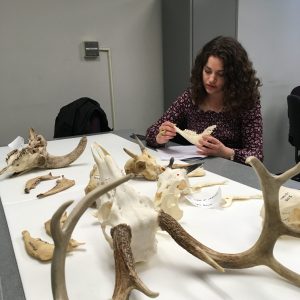 The goal of this course is to create new knowledge about the human past through the analysis of animal remains from archaeological sites. In this course we will learn the foundational skills of zooarchaeology, including the identification, aging and sexing of skeletal remains, and apply them to a specific problem in the human past. Problems to address include: 1) how can we identify the first domesticated animals in the prehistoric Middle East?; 2) how did prehistoric NC Indians exploit white-tailed deer and how did this affect the demographics, health and size of deer populations?; 3) did pre-European NC Indians domestic local wild turkeys?
The goal of this course is to create new knowledge about the human past through the analysis of animal remains from archaeological sites. In this course we will learn the foundational skills of zooarchaeology, including the identification, aging and sexing of skeletal remains, and apply them to a specific problem in the human past. Problems to address include: 1) how can we identify the first domesticated animals in the prehistoric Middle East?; 2) how did prehistoric NC Indians exploit white-tailed deer and how did this affect the demographics, health and size of deer populations?; 3) did pre-European NC Indians domestic local wild turkeys?
Offered:
Spring 2020
Faculty: Nicholas Law, Physics and Astronomy
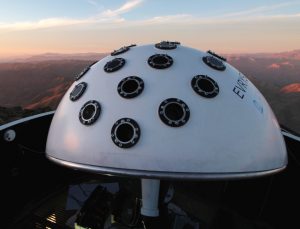 This course is a research-based exploration of UNC’s petabyte-scale dataset from the Evryscope telescope. The Evryscope monitors a huge part of the sky, taking images every two minutes and searching for changing objects, including exoplanets, superflares from active stars, supernovae and gravitational-wave events. Students will build software tools to dive into the Evryscope data and search for particular astronomical phenomena; since this is a brand-new dataset, discovering new things in the Universe is very likely. The class will present their discoveries in the Research and Making Expo, and each semester will aim to produce a refereed astronomical journal paper.
This course is a research-based exploration of UNC’s petabyte-scale dataset from the Evryscope telescope. The Evryscope monitors a huge part of the sky, taking images every two minutes and searching for changing objects, including exoplanets, superflares from active stars, supernovae and gravitational-wave events. Students will build software tools to dive into the Evryscope data and search for particular astronomical phenomena; since this is a brand-new dataset, discovering new things in the Universe is very likely. The class will present their discoveries in the Research and Making Expo, and each semester will aim to produce a refereed astronomical journal paper.
Offered:
Fall 2019 (Syllabus)
Spring 2019
Faculty: Barbara Stegenga, Biology
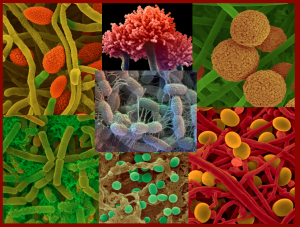 Students will be collaborating in an ongoing research project with Dr. Elizabeth Shank, a scientist in the Biology Department. Specifically, the Shank lab is interested in studying how different bacteria interact via small molecules produced by microbes. These molecules are important sources of therapeutic drugs for humans, and include antibiotics, antifungals, anticancer drugs, and immunosuppressive agents which most students connect to. The goal for the students in the course is to discover new small molecules secreted from soil microorganisms through the co-culture screening that students perform on many soil samples. Students will experience iteration by performing many screens on many samples and collaborate with each other to answer questions. In addition to using this type of co-culture screening, students will also use microbiology techniques such as plate streaking, isolating pure cultures, performing serial dilutions of bacteria to determine cell density and using fluorescent microscopy to help identify soil microbes.
Students will be collaborating in an ongoing research project with Dr. Elizabeth Shank, a scientist in the Biology Department. Specifically, the Shank lab is interested in studying how different bacteria interact via small molecules produced by microbes. These molecules are important sources of therapeutic drugs for humans, and include antibiotics, antifungals, anticancer drugs, and immunosuppressive agents which most students connect to. The goal for the students in the course is to discover new small molecules secreted from soil microorganisms through the co-culture screening that students perform on many soil samples. Students will experience iteration by performing many screens on many samples and collaborate with each other to answer questions. In addition to using this type of co-culture screening, students will also use microbiology techniques such as plate streaking, isolating pure cultures, performing serial dilutions of bacteria to determine cell density and using fluorescent microscopy to help identify soil microbes.
Offered:
Fall 2020
Spring 2020
Fall 2019 (Syllabus)
Fall 2018
Summer 2018 (Syllabus)
Faculty: Maria Servedio, Biology
 Mathematical models are an integral part of evolutionary biology, where they are used for a range of purposes, from providing approximate descriptions of phenomena to serving as formal tests of the logic of specific evolutionary hypotheses. Yet students in the biological sciences are rarely exposed to formal mathematical models of evolution during their undergraduate curriculum. This course introduces undergraduates to the use of mathematical models in evolution in topics ranging from sexual selection, to speciation, to cultural evolution. The course presents a variety of techniques, going into most depth in population genetic models and their analysis through analytical and numerical techniques. Students learn how to use the program Mathematica, with which they work through a variety of models to gain a better intuition about how evolutionary forces alter the composition of populations. Students also develop an original evolutionary research question to be explored using modeling techniques. Once their hypothesis is formed, they derive a mathematical model to address it, analyze the model and present their results both in a oral presentation and a written paper.
Mathematical models are an integral part of evolutionary biology, where they are used for a range of purposes, from providing approximate descriptions of phenomena to serving as formal tests of the logic of specific evolutionary hypotheses. Yet students in the biological sciences are rarely exposed to formal mathematical models of evolution during their undergraduate curriculum. This course introduces undergraduates to the use of mathematical models in evolution in topics ranging from sexual selection, to speciation, to cultural evolution. The course presents a variety of techniques, going into most depth in population genetic models and their analysis through analytical and numerical techniques. Students learn how to use the program Mathematica, with which they work through a variety of models to gain a better intuition about how evolutionary forces alter the composition of populations. Students also develop an original evolutionary research question to be explored using modeling techniques. Once their hypothesis is formed, they derive a mathematical model to address it, analyze the model and present their results both in a oral presentation and a written paper.
Offered:
Spring 2020
Fall 2017 (Syllabus)
Faculty: Chris Martin, Biology
 Did you know that the Venus flytrap is found only within a 75-mile radius around Wilmington, North Carolina? Or that some fish make a living by eating scales? This class will conduct publishable research in evolution and ecology by testing unanswered questions about the evolution of two spectacular adaptations: the Venus flytrap and the scale-eating pupfish. Students will be introduced to these fascinating organisms while conducting new research investigating the origins of these complex adaptations. Conceptually, the course will be organized as an in-depth study of adaptation, the creative scientific process, and an introduction to statistical graphing and data analysis.
Did you know that the Venus flytrap is found only within a 75-mile radius around Wilmington, North Carolina? Or that some fish make a living by eating scales? This class will conduct publishable research in evolution and ecology by testing unanswered questions about the evolution of two spectacular adaptations: the Venus flytrap and the scale-eating pupfish. Students will be introduced to these fascinating organisms while conducting new research investigating the origins of these complex adaptations. Conceptually, the course will be organized as an in-depth study of adaptation, the creative scientific process, and an introduction to statistical graphing and data analysis.
 Students will test hypotheses for the evolution of extraordinary adaptations in these systems by collecting field data on prey captured by carnivorous plants in nature, conducting prey capture experiments in the lab, and analyzing high-speed videos of prey capture. Students will be taught how to generate hypotheses, collect and analyze data in the R statistical programming language, discuss scientific literature, and publish their results. This research-intensive class will enable students to ask their own independent research questions and conduct experiments to answer them. The class will include a field trip to the Green Swamp, the home of the Venus flytrap, fieldwork on carnivorous plants at UNC’s Botanical Garden, an introduction to vertebrate animal research from the Division of Laboratory Animal Medicine, and practice recording high-speed videos of live pupfish scale-biting behavior in the instructor’s laboratory fish facility.
Students will test hypotheses for the evolution of extraordinary adaptations in these systems by collecting field data on prey captured by carnivorous plants in nature, conducting prey capture experiments in the lab, and analyzing high-speed videos of prey capture. Students will be taught how to generate hypotheses, collect and analyze data in the R statistical programming language, discuss scientific literature, and publish their results. This research-intensive class will enable students to ask their own independent research questions and conduct experiments to answer them. The class will include a field trip to the Green Swamp, the home of the Venus flytrap, fieldwork on carnivorous plants at UNC’s Botanical Garden, an introduction to vertebrate animal research from the Division of Laboratory Animal Medicine, and practice recording high-speed videos of live pupfish scale-biting behavior in the instructor’s laboratory fish facility.
Offered:
Spring 2018
Fall 2017 (Syllabus)
This course is no longer offered. BIOL 255H, offered by Dr. Christopher Willett has replaced it.
![]() See the published manuscript by students enrolled in The Evolution of Extraordinary Adaptations and Dr. Martin.
See the published manuscript by students enrolled in The Evolution of Extraordinary Adaptations and Dr. Martin.
Students use forensics sciences (primarily DNA barcoding) to quantify seafood mislabeling (e.g., farm raised tilapia sold as wild caught salmon). Seafood mislabeling is a significant global problem, with health and social consequences. Primarily this is a course about how to do science. How to develop scientific hypothesis, perform experiments, analyze data, write manuscripts, and publish results in a peer-reviewed journal. Along the way students will develop laboratory and general science skills and learn about fisheries and seafood sciences. This is meant to be an introduction to research: students are not expected to have any prior research experience. Additional topics covered include seafood supply chains and markets, fisheries management, over-fishing and its impact on marine ecosystems, and the importance of food labeling in human health. Through group work and whole-class collaboration, students will develop their own questions, collect data, and make conclusions.
Offered:
Fall 2020 Faculty: John Bruno
Fall 2019 (Syllabus) Faculty: Blaire Steinwand and John Bruno
Fall 2018 (Syllabus) Faculty: Blaire Steinwand and John Bruno
Fall 2017 (Syllabus) Faculty: Blaire Steinwand and John Bruno
- For more information read the College of Arts & Sciences article “Seafood Forensics” and view a collection of student posters. (7/2017)
![]() See the published manuscript by Dr. Steinwand and Dr. Bruno and collaborators about this course. (12/2018)
See the published manuscript by Dr. Steinwand and Dr. Bruno and collaborators about this course. (12/2018)
![]() See undergraduate student published manuscript “Marketplace Shrimp Mislabeling in North Carolina” from Seafood Forensics CURE class. (3/2020)
See undergraduate student published manuscript “Marketplace Shrimp Mislabeling in North Carolina” from Seafood Forensics CURE class. (3/2020)
![]() See undergraduate student published manuscript “A high proportion of red snapper sold in North Carolina” is mislabeled”. (6/2020)
See undergraduate student published manuscript “A high proportion of red snapper sold in North Carolina” is mislabeled”. (6/2020)
“UNC finds there’s something fishy about seafood labels” article in the News and Observer. (7/2020)
Faculty: Chris Willett, Biology
 Of course you know that the Venus flytrap catches and digests insects, did you also know that it is native almost entirely to North Carolina? Extraordinary adaptations can be found in numerous other organisms as well. In class we will also look at the exceptional environmental stress tolerance of a tidepool copepod and the incredible foraging and growth potential of the tobacco hornworm caterpillar. For example, this copepod can survive freezing, high salinities, low pH, and anoxic conditions and these caterpillars can rapidly increase in mass by 10-fold at the end of development.
Of course you know that the Venus flytrap catches and digests insects, did you also know that it is native almost entirely to North Carolina? Extraordinary adaptations can be found in numerous other organisms as well. In class we will also look at the exceptional environmental stress tolerance of a tidepool copepod and the incredible foraging and growth potential of the tobacco hornworm caterpillar. For example, this copepod can survive freezing, high salinities, low pH, and anoxic conditions and these caterpillars can rapidly increase in mass by 10-fold at the end of development.
This class will conduct publishable research in evolution and ecology by doing actual science on the Venus flytrap, tidepool copepod, and hornworm caterpillars. We will attempt to answer unknown questions about adaptations in these systems by using techniques such as high-speed video analysis, environmental manipulation, and potentially genetic analysis. Through this course students will be totally immersed in how research is done. Students will be taught how to generate hypotheses, collect and analyze data in the R statistical programming language, discuss scientific literature, and publish their results. This research-intensive class will enable students to ask their own independent research questions and conduct experiments to answer them. The class will include a field trip to the Green Swamp, the home of the Venus flytrap, and experimentation in the lab during the class on campus.
 This is meant to be an introduction to research: students are not expected to have any prior research experience. The science will be focused on primarily laboratory experiments measuring prey capture ability in the Venus flytrap and stress tolerance in the copepod and caterpillar systems. By focusing on both the instructor’s own systems and a wonderful plant found in North Carolina, students will receive a broad perspective on how to investigate and test hypotheses about adaptation in the field and lab. Additional topics covered include adaptationism, natural selection, convergent evolution, exaptation, phylogenetic thinking, evolutionary novelty at multiple levels, applications to human health, and conservation status of our study systems.
This is meant to be an introduction to research: students are not expected to have any prior research experience. The science will be focused on primarily laboratory experiments measuring prey capture ability in the Venus flytrap and stress tolerance in the copepod and caterpillar systems. By focusing on both the instructor’s own systems and a wonderful plant found in North Carolina, students will receive a broad perspective on how to investigate and test hypotheses about adaptation in the field and lab. Additional topics covered include adaptationism, natural selection, convergent evolution, exaptation, phylogenetic thinking, evolutionary novelty at multiple levels, applications to human health, and conservation status of our study systems.
Offered:
Spring 2020
Faculty: Sarah Grant, Biology
What happens to a genome after a catastrophic disturbance that leads to chromosome breakage? In Spring 2019, Biol 423L students will create such a catastrophic disturbance in yeast. Cells that survive will have repaired the broken chromosomes. The organization of the repaired genomes will provide information about chromosome structure and DNA repair mechanisms. Students will use genome sequence analysis methods to understand how the genomes of surviving yeast cells have been repaired. The class will involve organization of a research program, microbiological culture methods, genetic comparisons, statistical analysis and computation for genome sequence assembly. There will be two interim lab reports, two midterm exams and a poster presentation. The final exam will be in the form of a lab report comprehensive of the semester’s work. Prequisite: Biol 202 Molecular Biology and Genetics. Previous knowledge of computer coding is not required.
Offered:
Spring 2020
Spring 2019
Spring 2018 (Syllabus)
Faculty: Paul Maddox, Biology
Course description will be available soon.
Offered:
Fall 2020
Fall 2019
Faculty: Stephen Rogers, Biology
Faculty: Kevin Slep, Biology
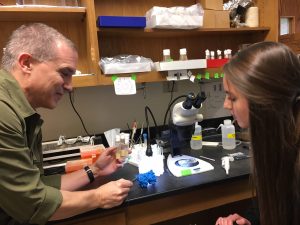 BIOL 544 is a laboratory course offering students an opportunity to conduct cutting-edge biochemical, biophysical, and cell biological research on the cytoskeleton, with a focus on the microtubule-associated protein (MAP) tau, which is associated with Alzheimer’s Disease. Students in this three-credit course will spend class time engaging with the scientific literature to learn relevant background material about tau, how it regulates the cytoskeleton, and its role in disease and develop hypotheses that will be tested during the semester. Students will work with the instructors and peers in groups to design experiments to test these hypotheses using approaches that build off ongoing research in the labs of two UNC faculty members and interpret experimental data to make conclusions. Students in the course will learn how to perform techniques commonly used in biochemical research, how to evaluate and discuss possible approaches to investigate the biological problem of study, and how to report their results at the end of the semester. Students will prepare detailed notes in their laboratory notebooks, and as their final exam, they will submit their laboratory books and each student will produce and present a poster on their collaborative work.
BIOL 544 is a laboratory course offering students an opportunity to conduct cutting-edge biochemical, biophysical, and cell biological research on the cytoskeleton, with a focus on the microtubule-associated protein (MAP) tau, which is associated with Alzheimer’s Disease. Students in this three-credit course will spend class time engaging with the scientific literature to learn relevant background material about tau, how it regulates the cytoskeleton, and its role in disease and develop hypotheses that will be tested during the semester. Students will work with the instructors and peers in groups to design experiments to test these hypotheses using approaches that build off ongoing research in the labs of two UNC faculty members and interpret experimental data to make conclusions. Students in the course will learn how to perform techniques commonly used in biochemical research, how to evaluate and discuss possible approaches to investigate the biological problem of study, and how to report their results at the end of the semester. Students will prepare detailed notes in their laboratory notebooks, and as their final exam, they will submit their laboratory books and each student will produce and present a poster on their collaborative work.
Offered:
Fall 2020
Faculty: Lori Del Negro, Chemistry

Students will be working in collaboration with a real-time outreach project related to solar fuels, funded by the NSF Center for Chemical Innovation and the Camille & Henry Dreyfus Foundation, Inc. Students will be collaborators with UNC’s Dr. Jillian Dempsey and her research team on a project, known as HARPOON (Heterogeneous Anodes Rapidly Perused for Oxygen Overpotential Neutralization).
Students will screen nonprecious metal oxides to find combinations and concentrations that function as catalysts to split water for use as a solar fuel. The project allows students to develop their own focused research questions and hypotheses about the most promising metals and combinations. Through this project, students will run experiments using electrochemistry and fluorescence spectroscopy. Students will collaborate in teams and will submit their experimental results and research papers to the growing HARPOON database.
Offered:
Spring 2018 (Syllabus)
Faculty: Leslie Hicks, Chemistry
 In this research-oriented honors analytical methods lab, students will be answering an open research question in groups–working with a kinase that has not yet been characterized in nature. They will use learn various biochemical/analytical techniques for heterologous protein expression and characterization such as chromatographic, spectroscopic, and mass spectrometry/proteomics methods. Using these methods, they will carry out a real-world analysis towards elucidation of protein kinase-substrate relationships. Module 1 focuses on heterologous expression and protein purification (sessions 1-3); Module 2 covers protein identification via bottom-up proteomics technology (sessions 4-8); Module 3 confirms activity of the expressed enzyme (session 9); and the last session will be devoted to presenting the data in a written and presentation format.
In this research-oriented honors analytical methods lab, students will be answering an open research question in groups–working with a kinase that has not yet been characterized in nature. They will use learn various biochemical/analytical techniques for heterologous protein expression and characterization such as chromatographic, spectroscopic, and mass spectrometry/proteomics methods. Using these methods, they will carry out a real-world analysis towards elucidation of protein kinase-substrate relationships. Module 1 focuses on heterologous expression and protein purification (sessions 1-3); Module 2 covers protein identification via bottom-up proteomics technology (sessions 4-8); Module 3 confirms activity of the expressed enzyme (session 9); and the last session will be devoted to presenting the data in a written and presentation format.
Offered:
Fall 2019 (Syllabus)
Spring 2019
Fall 2018 (Syllabus)
Fall 2017 (Syllabus)
Faculty: Nita Eskew, Chemistry
Faculty Maribel Borger, Chemistry
Faculty: Danielle Zurcher, Chemistry

Students will be working in collaboration with an ongoing UNC Chemistry research project with Dr. David Nicewicz and his research team on the syntheses and analyses of pyrylium salts. Pyrylium salts are brightly colored molecules that have found use in the developing field of photoredox catalysis. Their utility comes from their ability to absorb visible light and enter higher energy excited electronic states. An important factor in using pyrylium salts is the wavelength of light that they absorb. The absorption spectra of these pyryliums are dependent on the substituents present on the phenyl rings. The goal of this project is to synthesize a library of pyrylium bisulfate salts and characterize them since little is known about their catalytic properties. A module will include the synthesis and purification of chalcones and conversion of chalcones to pyrylium salts. The pyrylium salts will be analyzed using NMR, UV-Vis, and fluorescence spectroscopy and cyclic voltammetry. These salts will be tested for catalytic 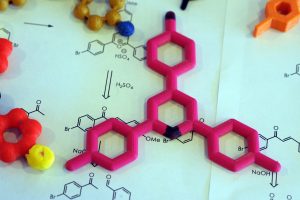 efficacy in an alcohol oxidation reaction. Students will work in teams and prepare research papers describing their work.
efficacy in an alcohol oxidation reaction. Students will work in teams and prepare research papers describing their work.
Offered:
Fall 2020 Faculty: Nita Eskew
Spring 2020 Faculty: Maribel Borger
Fall 2019 (Syllabus) Faculty: Danielle Zurcher
Summer 2019 Faculty: Danielle Zurcher
Spring 2019 Faculty: Nita Eskew
Fall 2018 (Syllabus) Faculty: Nita Eskew
Spring 2018 (Syllabus) Faculty: Nita Eskew
Fall 2017 (Syllabus) Faculty: Nita Eskew
- Check out this College of Arts & Sciences spotlight article. (1/2018)
Faculty: Nita Eskew, Chemistry
This is an APPLES service-learning CURE course that partners with the Carolina Community Garden (CCG). Students will work in the garden to plant, care for, and/or harvest purslane (Portulaca oleracea), an edible medicinal plant, depending on the season. In the lab, partners will work together to analyze the concentrations of antioxidants in harvested purslane. A variety of lab techniques will be used, including extraction and UV-Vis spectroscopy. Students will keep a journal for reflection of their service work, and a lab notebook will be used for recording all experimentation. At the end of the semester, each student will write a summary paper, and teams will prepare and present research posters describing their projects. Our findings will be shared with the CCG. See an example of a student poster.
Offered:
Spring 2020
Fall 2017 (Syllabus)
- Also see the Endeavors article CURE-ious Chemistry. (10/2017)
Faculty: Jeffrey Dick, Chemistry
 Service is an integral part of education, and many course can be designed such that students learn the necessary material, pursue a scientific question that is on the frontier of human knowledge, and use results to have a broad impact on the community. In CHEM 445, students will have the opportunity to learn experimental and theoretical electroanalytical chemistry. Throughout the semester, students will work on a feasible project building and designing potentiostat. Students use this potentiostat to begin unraveling the mysteries as to why nanoparticules behave differently than bulk material, and at the end of the day, students will create the opportunity to donate their potentiostat to another school in hopes they can pursue similar studies. Science is about the spread of knowledge and experience – the more programs that are equipped with instruments to push their science to the nanoscale, the more discoveries and understanding we will collectively achieve.
Service is an integral part of education, and many course can be designed such that students learn the necessary material, pursue a scientific question that is on the frontier of human knowledge, and use results to have a broad impact on the community. In CHEM 445, students will have the opportunity to learn experimental and theoretical electroanalytical chemistry. Throughout the semester, students will work on a feasible project building and designing potentiostat. Students use this potentiostat to begin unraveling the mysteries as to why nanoparticules behave differently than bulk material, and at the end of the day, students will create the opportunity to donate their potentiostat to another school in hopes they can pursue similar studies. Science is about the spread of knowledge and experience – the more programs that are equipped with instruments to push their science to the nanoscale, the more discoveries and understanding we will collectively achieve.
Offered:
Fall 2020
Fall 2019
Spring 2019
Fall 2018 (Syllabus)
Faculty: Alex Zhukhovitskiy, Chemistry
Faculty: Frank Leibfarth, Chemistry
 This CURE course will seek to tranform the properties of commodity plastics through the discovery and development of new polymer C-H functionalization chemistries. Through the course, students will gain skills in synthetic chemistry, catalysis, polymer processing, and advanced polymer characterization techniques. Most importantly, students will be required to employ the scientific method to validate and optimize the reactivity of polymers and understand their subsequent structure-property relationships. The proposed research project constitutes an interdisciplinary approach to the modification of synthetic polymers with potential applications in plastic recycling, functional coating, and optical films.
This CURE course will seek to tranform the properties of commodity plastics through the discovery and development of new polymer C-H functionalization chemistries. Through the course, students will gain skills in synthetic chemistry, catalysis, polymer processing, and advanced polymer characterization techniques. Most importantly, students will be required to employ the scientific method to validate and optimize the reactivity of polymers and understand their subsequent structure-property relationships. The proposed research project constitutes an interdisciplinary approach to the modification of synthetic polymers with potential applications in plastic recycling, functional coating, and optical films.
Offered:
Spring 2020 Faculty: Alex Zhukhovitskiy
Spring 2019 Faculty: Frank Liefarth
Spring 2018 (Syllabus) Faculty: Frank Liefarth
Faculty: Alex Zhukhovitskiy, Chemistry
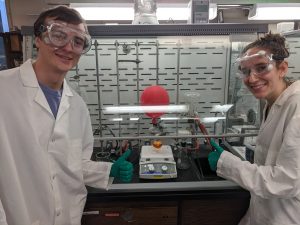 Plastics waste accumulation is a problem of global proportions. The Polymer Chemistry Lab is a CURE course designed to address this challenge: students will develop degradable analogues of existing plastics and investigate new polymer degradation mechanisms. In this context, students will gain experience in the advanced synthesis, characterization, and processing techniques applicable to polymers. Critically, the chemistry developed in this course, while related to the instructor’s research, has no precedent, and will require the students to engage in the scientific method. Students will design hypothesis-driven experiments, test positive and negative controls, and engage in critical analysis and creative thinking. Ultimately, the students will communicate their results in both written and oral formats, with the goal of eventual publication.
Plastics waste accumulation is a problem of global proportions. The Polymer Chemistry Lab is a CURE course designed to address this challenge: students will develop degradable analogues of existing plastics and investigate new polymer degradation mechanisms. In this context, students will gain experience in the advanced synthesis, characterization, and processing techniques applicable to polymers. Critically, the chemistry developed in this course, while related to the instructor’s research, has no precedent, and will require the students to engage in the scientific method. Students will design hypothesis-driven experiments, test positive and negative controls, and engage in critical analysis and creative thinking. Ultimately, the students will communicate their results in both written and oral formats, with the goal of eventual publication.
Offered:
Spring 2021

Faculty: Thomas Freeman, Chemistry
Do proteins from a unique kind of bacterium function similarly to human proteins that repair DNA damage and prevent cancer? Students in this class will learn techniques to clone, purify, and characterize DNA mismatch repair proteins from the bacterium Thermus aquaticus. Although the natural DNA repair process was the topic of the Nobel Prize in Chemistry in 2015, nobody has characterized the proteins and their functions in Thermus aquaticus, a bacterium that lives in extreme heat. Other proteins from this bacterium have revolutionized technique in molecular biology, so the natural processes that prevent DNA mutations within this unique bacterium are of great interest to scientists. Students work collaboratively to collect and analyze data in groups and will learn to communicate their findings clearly via written and oral presentations.
Offered:
Fall 2020 Faculty: Thomas Freeman
Spring 2020 Faculty: Thomas Freeman
Fall 2019 Faculty: Thomas Freeman
Spring 2019 Faculty: Thomas Freeman
Spring 2018 (Syllabus) Faculty: Thomas Freeman
Fall 2017 Faculty: Dorothy Erie and Thomas Freeman
Faculty: Joseph Templeton, Chemistry
Faculty: Kathleen Nevins, Chemistry
Description coming soon.
Offered:
Fall 2020
Spring 2020
Faculty: Jeff Terrell, Computer Science
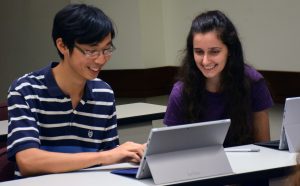 Computer science students learn theory and concepts about programming and computers. With a good understanding of the basics, they can apply their software skills in COMP 523: Software Engineering Laboratory, in which teams of three to four students tackle a significant software project with training and coaching from an experienced software engineer. Each project is unique and driven by a real need for software felt by somebody outside the class, so students get real-world experience working on an uncontrived software project. It is arguably the best preparation for a career in the lucrative field of software engineering that students can find at Carolina.
Computer science students learn theory and concepts about programming and computers. With a good understanding of the basics, they can apply their software skills in COMP 523: Software Engineering Laboratory, in which teams of three to four students tackle a significant software project with training and coaching from an experienced software engineer. Each project is unique and driven by a real need for software felt by somebody outside the class, so students get real-world experience working on an uncontrived software project. It is arguably the best preparation for a career in the lucrative field of software engineering that students can find at Carolina.
Offered:
Fall 2020
Fall 2019 (Syllabus)
Faculty: Jane Cooley Fruehwirth, Economics
Each semester will have a theme related to thriving in college and hurdles students face to thriving. Students will work in teams to develop measures of their chosen aspect of success within that theme. Students will be challenged to develop questions around their measure of success that are meaningful, in the sense of having the potential to inform university or college student choices. Teams will use existing literature, data and survey methods to study their question.
Offered:
Fall 2020
Faculty: Ayesha Hashim, School of Education
System Improvement and Implementation at Scale (3 credit hours) is a collaborative, experiential, and data-driven course for understanding and facilitating organizational learning and change. The course is grounded in improvement science; a problem-solving methodology centered around continuous inquiry and learning. Improvement science seeks to develop, revise, fine-tune, and scale up new tools, processes, work roles and relationships for organizational change through rapid and iterative cycles of testing. Through this process of continuous inquiry, researchers work with practitioners to identify organizational needs, develop ideas for change, and then generate evidence on how to implement these ideas reliably across varied contexts.
Following the improvement science approach, students in the class will conduct an “improvement research project”, directing their course of study around three core questions: “What is the specific problem I am now trying to solve? What change might I introduce and why? And, how will I know whether the change is actually an improvement?” (Bryk et al., 2015, p.9). Through iterative testing, students will refine ideas based on evidence from what actually happened, develop a better understanding of the actual problem that needs to be solved, and learn how to design more feasible and context-specific interventions for change. This course will prepare students to work in complex organizations where the tasks that people do, along with the processes and tools they use, can vary substantially based on surrounding policies, structures, and norms.
Offered: Spring 2021
Faculty: Geoff Bell, Environment, Ecology, and Energy Program
Students learn the ecological features and mechanisms that enable ecosystems to be self-sustaining and resilient, the ecological theories that form the foundation of restoration ecology, and how these theories are used to inform ecological restoration projects. The UNC campus, particularly Battle Park, serves as a learning laboratory to teach students practical field skills including vegetation sampling, water quality monitoring, and stream morphology survey techniques and how to use common ecological field equipment. Students apply these concepts and skills by working in small groups to design and conduct an experiment so they can collect and analyze data that will inform the restoration efforts of their local community partner. (Read more about the Fall 2016 Restoration Ecology class.)
Faculty: Rachel Noble, Environment, Ecology, and Energy Program
Offered: to be determined
Faculty: Rachel Noble, Environment, Ecology, and Energy Program
Offered: to be determined
Faculty: Jennifer Larson, English and Comparative Literature
ENGL 385 students will read landmark court decisions alongside plays that speak directly to those cases and/or were written in response to those cases. Each paring’s discussion will focus on the cultural, political, and historical contexts of both the case’s hearing/decision and the play’s creation/performance. We will also examine contextual primary materials—including letters, interviews, oral histories, and court transcripts—about the cases we read in the course (as well as related cases), with an eye toward understanding how the plays that correspond with these cases have shaped and have been shaped by the contexts these materials describe. Together, we will consider novel questions such as: How does reading/understanding the court’s language influence our reading/understanding of the literature related to the court’s ruling and vice-versa? How do the primary documents related to a case and a text influence our understanding of the cultural, artistic, and political influences that shaped the case and text? How are court opinions themselves a type of literature that is in conversation with other literary works? How and why does drama engage the court most directly?
Offered:
Fall 2020
Fall 2019 (Syllabus)
Fall 2018 (Syllabus)
Faculty: Courtney Rivard, English and Comparative Literature
Students will work on a collaborative project between UNC, Yale University, and the University Richmond to merge an archival collection held at UNC’s Southern Historical Collection into a public, internet-based, Digital Humanities Project. The site will bring together all the photographs taken by the Farm Security Administration during the Great Depression with over 1200 Life Histories from the Federal Writers’ Project. Users of the platform will be able to simultaneously search the merged collections, and generate data visualizations by using the metadata extracted from these materials. Students will help to build the infrastructure to make this user experience happen by creating a metadata schema for the life histories, marking up the life histories in TEI (similar to XML), employing text analysis to study trends in the text based data, and generating data visualizations to explore unseen connections in the material. In order to do this, students will have to confront the role of rhetoric in data construction as they decide which terms to select as metadata categories and how to mark-up antiquated, racist, and sexist terms that pervade many of these texts. They will productively struggle to find a balance between maintaining the authenticity of the documents and using the technology with eye towards social justice and greater inclusion. In so doing, students will learn key theories and marketable skills in Digital Humanities and Digital Rhetoric by becoming digital makers.
Offered:
Spring 2020
Fall 2018 (formally ENGL 353)
![]() See the published manuscript by Dr. Rivard. (6/2019)
See the published manuscript by Dr. Rivard. (6/2019)
![]() See the published essay by Dr. Rivard and colleagues. (2019)
See the published essay by Dr. Rivard and colleagues. (2019)
Faculty: Jonathan Jensen, Exercise and Sport Science
Students will be exposed to the rapidly growing field of sport analytics through a course that introduces the fundamental statistical concepts necessary to the application of predictive analytics. Students will have access to a large, robust data source via the course’s partnership with SBRNet’s Sports Market Analytics site, allowing for a wide variety of potential sport-related applications. During the course, students will learn quantitative methodologies such as single, multiple, and logistic regression modeling and have the opportunity to apply the skills they have learned in a real-world project by building their own predictive models. Students will work collaboratively in groups, peer-review each other’s work, and present their work to an industry professional at the end of the semester.
Offered:
Fall 2020
Fall 2019 (Syllabus)
Faculty: Clark Gray, Geography
Students use statistical and spatial methods to conduct novel research on the consequences of climate change and variability for human development. The focus will be on the developing world where the consequences of climate change are expected to be most severe, and the course will take advantage of an abundance of new high-quality data sources from these countries. Each year the course focuses on a new research question on the frontier of knowledge in climate and development. For example, are the changing precipitation patterns and increasing temperatures associated with climate change contributing to child stunting and underweight in Sub-Saharan Africa? Future sections of the course are expected to focus on climate and poverty, climate and migration, or climate and education in various world regions. The Intergovernmental Panel on Climate Change, among many others, has named climate social science of this type as a critical research need. The goal will be for each class to produce a co-authored manuscript to be submitted to a peer-reviewed academic journal.
Faculty: Drew Coleman, Geological Sciences

This seminar is designed around a one-week field trip to eastern California, where students will study geologic features including active volcanoes, earthquake-producing faults, evidence for recent glaciations and extreme climate change, and how locals deal with living on active geologic features. Before the field trip, the class will meet twice a week to go over basic geologic principles and to work on field research topics for which student groups will be responsible. During the trip students will work on specific research projects (e.g., making a geologic map of a small area; mapping, measuring, and describing an active fault; observing and recording glacial features on a hike), and collect samples for an original, small group, research project. After the field trip students will complete laboratory analysis of samples and present the results of their research to the Department. See an example of the 2016 research projects in the GEOL 72H 2016 Journal Publication.
Offered:
Fall 2020
Fall 2019 (Syllabus)
Fall 2018
Fall 2017
Faculty: Xiaoming Liu, Geological Sciences
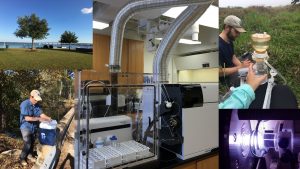 How do metals behave in surface and ground waters? Are drinking water reservoirs safe in terms of toxic metals, like chromium and lead? What is the fate of elements during weathering and erosion of rocks and soils? These are just a few of the types of novel questions students will answer that relate to many different aspects of geological and environmental science research. Students will learn proper field sampling of rock, water, and soils, how to chemically prepare of samples for analysis, and operation of the state-of-the-art mass spectrometer (ICP-MS). In addition, students will interpret their data with basic statics and data analysis skills, which may include various visualization and statistic software packages, such as R, Matlab, and ArcGIS. Students will have multiple opportunities for collaboration, peer-review, and communication. Students will present orally through a poster presentation and write a summary report to the university and local community at the end of the semester.
How do metals behave in surface and ground waters? Are drinking water reservoirs safe in terms of toxic metals, like chromium and lead? What is the fate of elements during weathering and erosion of rocks and soils? These are just a few of the types of novel questions students will answer that relate to many different aspects of geological and environmental science research. Students will learn proper field sampling of rock, water, and soils, how to chemically prepare of samples for analysis, and operation of the state-of-the-art mass spectrometer (ICP-MS). In addition, students will interpret their data with basic statics and data analysis skills, which may include various visualization and statistic software packages, such as R, Matlab, and ArcGIS. Students will have multiple opportunities for collaboration, peer-review, and communication. Students will present orally through a poster presentation and write a summary report to the university and local community at the end of the semester.
Offered:
Spring 2020
Faculty: Sarah Shields, History
 For this course, students explore the importance of water in the Middle East by focusing on dams. Working in pairs, they will choose one dam at the beginning of the semester, and research documents to answer questions such as: What was the area like before the dam was built? How did the agency building the dam explain the need for it? Students will also propose and develop a way to visualize the impacts of the dam and answer questions such as: Whose villages would benefit and whose would be destroyed? Which downstream countries would be influenced with what sorts of consequences? How could the negative effects of the dam have been avoided? Student research will be made available to a broader public through an online website using ArcGIS online story maps and include illustrations using a geography virtual reality tool, the Augmented Reality Sandbox. In addition to learning historians’ tools and practices to create the most probably narrative to understand the past, students will learn to write coherently as they prepare their online presentation, peer-evaluate each other, and learn to present their information cogently during oral presentations.
For this course, students explore the importance of water in the Middle East by focusing on dams. Working in pairs, they will choose one dam at the beginning of the semester, and research documents to answer questions such as: What was the area like before the dam was built? How did the agency building the dam explain the need for it? Students will also propose and develop a way to visualize the impacts of the dam and answer questions such as: Whose villages would benefit and whose would be destroyed? Which downstream countries would be influenced with what sorts of consequences? How could the negative effects of the dam have been avoided? Student research will be made available to a broader public through an online website using ArcGIS online story maps and include illustrations using a geography virtual reality tool, the Augmented Reality Sandbox. In addition to learning historians’ tools and practices to create the most probably narrative to understand the past, students will learn to write coherently as they prepare their online presentation, peer-evaluate each other, and learn to present their information cogently during oral presentations.
Offered:
Fall 2019 (Syllabus)
Faculty: Ryan Shaw, Information and Library Science
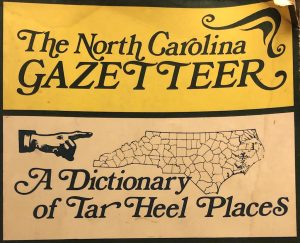 Join a cooperative effort to build a digital gazetteer of North Carolina places. Our goal is to help the people of North Carolina communicate about the places they live in, visit, and study. We will to do this by designing, building, and maintaining place-based digital infrastructure for the UNC System and other public institutions of North Carolina. You’ll develop experience in planning and implementing a state-of-the-art system for collecting, cleaning, enriching, and publishing data. If we’re successful, the public infrastructure we create will enhance our ability to find, understand, share and remember the places we care about.
Join a cooperative effort to build a digital gazetteer of North Carolina places. Our goal is to help the people of North Carolina communicate about the places they live in, visit, and study. We will to do this by designing, building, and maintaining place-based digital infrastructure for the UNC System and other public institutions of North Carolina. You’ll develop experience in planning and implementing a state-of-the-art system for collecting, cleaning, enriching, and publishing data. If we’re successful, the public infrastructure we create will enhance our ability to find, understand, share and remember the places we care about.
Offered:
Spring 2020
Faculty: Arcot Rajasekar, Information and Library Science
Faculty: Maggie Melo, Information and Library Science
 Data science is changing the way we do science, business and even everyday life. Data science spans multiple disciplines, and applies scientific methods, processes, algorithms and systems to extract knowledge and insights from structured and unstructured data. In this course, we are particularly interested in collecting and applying real-time data to gain insights and knowledge about environmental and ecological phenomenon around us. Real-time data from multiple sensors can be fused and analyzed to get a deeper understanding of micro-climates including those in and around buildings and communities. In this course, students will posit research questions about enviro-sensing, build sensor systems for gathering multiple-types of real-time data in order to test their hypothesis. Students will also gain experience in managing data life-cycles by developing data pipelines to gather, store, and analyze data to effectively extract and visualize useful information.
Data science is changing the way we do science, business and even everyday life. Data science spans multiple disciplines, and applies scientific methods, processes, algorithms and systems to extract knowledge and insights from structured and unstructured data. In this course, we are particularly interested in collecting and applying real-time data to gain insights and knowledge about environmental and ecological phenomenon around us. Real-time data from multiple sensors can be fused and analyzed to get a deeper understanding of micro-climates including those in and around buildings and communities. In this course, students will posit research questions about enviro-sensing, build sensor systems for gathering multiple-types of real-time data in order to test their hypothesis. Students will also gain experience in managing data life-cycles by developing data pipelines to gather, store, and analyze data to effectively extract and visualize useful information.
Offered:
Fall 2021
Faculty: Scott Gifford and Karl Castillo, Marine Sciences
This is a hands-on undergraduate course that exposes students to the world of marine science and biology, and its application to understanding how coral ecosystems will respond to climate change. Students will beginning by researching historical trends in physical conditions (i.e., temperature, salinity, light) and plankton abundance on temperate reefs on the North Carolina coast. They will then use the resulting data to design a laboratory- experiment to test the effects of ocean warming and decrease food availability for heterotrophy on the calcification rates of the temperate corals Oculina arbuscula, and Astrangia poculata and their associated microbiota.
Offered:
Fall 2021
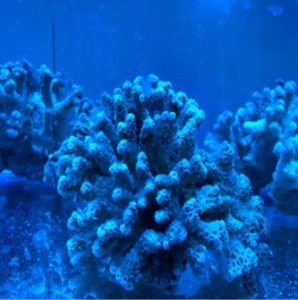
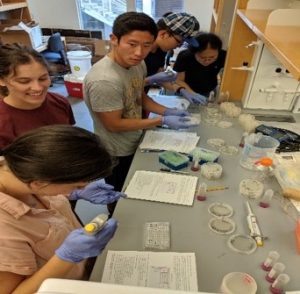
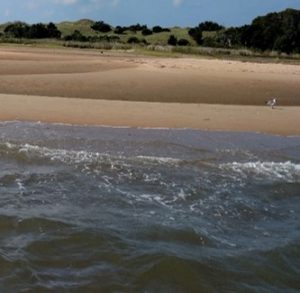
Faculty: Marc Alperin, Marine Sciences
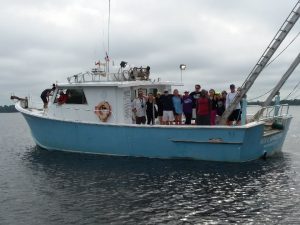 North Carolina is home to some of the nation’s most productive, most scenic, and most threatened estuaries. This class will use the Neuse River estuary as a case study to examine both natural processes and human impacts on estuarine systems. The course includes one week of field work based at the Institute of Marine Sciences. The class is heavily “hands-on” and will blend field research, laboratory analyses, and data synthesis and interpretation. The course is suitable for both science and non-science majors, and will use team-based, cooperative-learning to accommodate differences in student’s math and science backgrounds. The Maymester format (three intense weeks) is ideal for extensive team interactions and a week-long field trip. (Satisfies Experiential Education [EE] and Physical Life Science with Lab [PX] requirements.)
North Carolina is home to some of the nation’s most productive, most scenic, and most threatened estuaries. This class will use the Neuse River estuary as a case study to examine both natural processes and human impacts on estuarine systems. The course includes one week of field work based at the Institute of Marine Sciences. The class is heavily “hands-on” and will blend field research, laboratory analyses, and data synthesis and interpretation. The course is suitable for both science and non-science majors, and will use team-based, cooperative-learning to accommodate differences in student’s math and science backgrounds. The Maymester format (three intense weeks) is ideal for extensive team interactions and a week-long field trip. (Satisfies Experiential Education [EE] and Physical Life Science with Lab [PX] requirements.)
Please see video for additional information about the course.
Offered:
Maymester 2019
Maymester 2018 (Syllabus)
Maymester 2017 (Syllabus)
Faculty: Scott Gifford, Marine Sciences
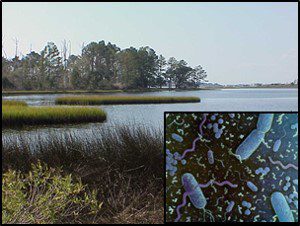 The students will center their learning and practice on a specific research question of importance to the scientific community: How can the information contained in the genomes of marine bacteria inform us about the ways different microbial taxa shape the organic chemistry of the ocean? Each liter of seawater contains over a million different bacterial cells that are organized in complex microbial communities, often consisting of hundreds to thousands of different species. The course will begin with a field trip in which students culture microbes from a local aquatic environment. The students will then learn how to extract DNA from their isolates and then submit their samples for genome sequencing. Upon return of their data, students will learn how to assemble complete genomes and will characterize the basic features of the genomes. The class will develop a database allowing them to cross-compare each other’s genomes and public databases. Finally, students will infer the ecological roles of their isolated organism in the ecosystem from which they were obtained based on the genomic data. A major challenge in environmental microbiology is being able to connect a unique ecological role to each of this species giving the overwhelming genetic diversity.
The students will center their learning and practice on a specific research question of importance to the scientific community: How can the information contained in the genomes of marine bacteria inform us about the ways different microbial taxa shape the organic chemistry of the ocean? Each liter of seawater contains over a million different bacterial cells that are organized in complex microbial communities, often consisting of hundreds to thousands of different species. The course will begin with a field trip in which students culture microbes from a local aquatic environment. The students will then learn how to extract DNA from their isolates and then submit their samples for genome sequencing. Upon return of their data, students will learn how to assemble complete genomes and will characterize the basic features of the genomes. The class will develop a database allowing them to cross-compare each other’s genomes and public databases. Finally, students will infer the ecological roles of their isolated organism in the ecosystem from which they were obtained based on the genomic data. A major challenge in environmental microbiology is being able to connect a unique ecological role to each of this species giving the overwhelming genetic diversity.
Faculty: Sabrina Robertson, Psychology and Neuroscience
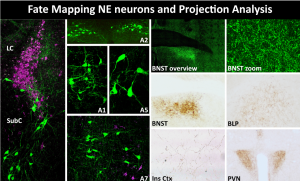 Students in NSCI 275: Molecular Brain Imaging will design novel experiments to examine and visualize sex differences in the nervous system. Students will learn how to handle brain slices, neuroanatomy, microscopy, immunohistochemistry and imaging analysis techniques by studying neuronal diversity in the norepinephrine system of mice. Students will have the opportunity to develop and test their own hypotheses, write a research proposal, and present their work in poster form.
Students in NSCI 275: Molecular Brain Imaging will design novel experiments to examine and visualize sex differences in the nervous system. Students will learn how to handle brain slices, neuroanatomy, microscopy, immunohistochemistry and imaging analysis techniques by studying neuronal diversity in the norepinephrine system of mice. Students will have the opportunity to develop and test their own hypotheses, write a research proposal, and present their work in poster form.
Offered:
Spring 2020
Faculty: Rachel Penton, Psychology and Neuroscience
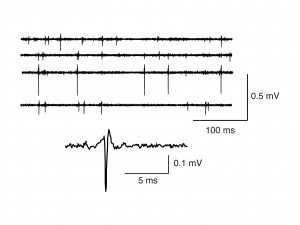 Are there sex differences in nervous system control of food seeking? NSCI 276 students will learn electrophysiological techniques by studying taste receptor sensitivity in fruit flies in response to behavioral and/or genetic interventions that the students hypothesize will alter food seeking. Focusing on electrophysiology for the semester will allow students to learn how to measure and analyze electrical activity in the nervous system as well as learn how behavioral and/or genetic manipulations can change this activity. Many research findings have been demonstrated and replicated in only males or the sex of animals contributing to the finding are not specified in the published research article. Therefore, students will develop their own hypotheses and design experiments to study the novel problem of sex differences in neuronal activity underlying food-seeking behavior. Students will collaboratively analyze primary research literature, design experiments, write a research proposal, analyze data, and learn to present their work in poster form.
Are there sex differences in nervous system control of food seeking? NSCI 276 students will learn electrophysiological techniques by studying taste receptor sensitivity in fruit flies in response to behavioral and/or genetic interventions that the students hypothesize will alter food seeking. Focusing on electrophysiology for the semester will allow students to learn how to measure and analyze electrical activity in the nervous system as well as learn how behavioral and/or genetic manipulations can change this activity. Many research findings have been demonstrated and replicated in only males or the sex of animals contributing to the finding are not specified in the published research article. Therefore, students will develop their own hypotheses and design experiments to study the novel problem of sex differences in neuronal activity underlying food-seeking behavior. Students will collaboratively analyze primary research literature, design experiments, write a research proposal, analyze data, and learn to present their work in poster form.
Offered:
Fall 2020
Faculty: Mariska Leunissen, Philosophy
Why is it that almost all ancient philosophical texts focus solely on the views of the elite male members of Greek society? What happened to the voices of the women, the foreigners (or ‘barbarians’ as the Greeks referred to them), and the less-than-privileged? In this course, we will study – through the examination of several infamous, ignored, or otherwise uncharted Greek texts of the classical period – the views about gender and race as presented in ancient Greek philosophy, medicine, and science. Our aims are to generate a new understanding of how the male elite used such views to further promote or justify (or perhaps challenge) the existing marginalization and silencing of women, foreigners, and less privileged men and to maintain their own social, political, and intellectual privilege. We will also consider how ancient perspectives about these issues remain current and influential today.
Some of the questions we will address are: What explanations did the ancient Greeks in the classical period provide for the differences between humans and animals, men and women, slaves and free men, barbarians and Greeks? What role did notions such as racial formation/racial origin play in the development of Classical Greek theories of ethnic superiority (e.g. the myth of Athenian autochthony)? How did they see the relationship between biological descent versus cultural or national identity? How did the Greeks of the Classical Period understand sex and gender? In what ways did ‘scientific’ ideas about women and barbarians influence the ethical and political philosophies of the classical period? How were philosophical theories used to promote, challenge, or maintain the existing marginalization of women and barbarians?
Offered:
Fall 2020
Faculty: Anna Krome-Lukens, Public Policy
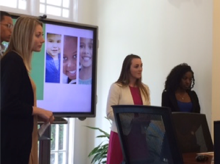 In this course, students tackle unique policy questions posed by community partners, including government agencies and non-profit organizations. Over the course of the semester, student teams meet with their client, develop a work plan, research relevant policy issues, collect data, identify and analyze policy options, and present actionable recommendations to their client. Through their consulting work, students integrate the skills and knowledge they have developed as Public Policy majors and develop skills in teamwork, project planning, and professional communication.
In this course, students tackle unique policy questions posed by community partners, including government agencies and non-profit organizations. Over the course of the semester, student teams meet with their client, develop a work plan, research relevant policy issues, collect data, identify and analyze policy options, and present actionable recommendations to their client. Through their consulting work, students integrate the skills and knowledge they have developed as Public Policy majors and develop skills in teamwork, project planning, and professional communication.
Offered:
Fall 2020
Fall 2019 (Syllabus)
Faculty: Mark Crescenzi and Stephen Gent, Political Science
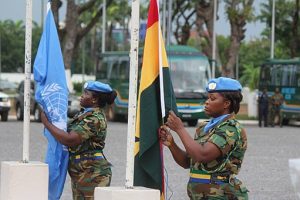
Students conduct quantitative research on peace, conflict, and conflict resolution. Over the course of the semester, students work in teams to create original research projects that answer policy-relevant questions in the field of peace science. Through hands-on experience with data gathering and analysis, students learn how to develop and test novel hypotheses about the causes and consequences of conflict as well as the processes of conflict resolution and management.
Faculty: Viji Sathy, Psychology and Neuroscience
Students ask novel questions and assess constructs that they use to survey their peers around a semester theme. Past themes have included topics that are timely to campus: course evaluations (student motivation, length, quality of feedback, etc.), learning environments (small vs. large classes, laptop policies, active learning, etc.), and identity (race, gender, academic, etc.). Students iterate around construct design, statistical methods, and writing and presenting their work.
Offered:
Spring 2020
Fall 2019 (Syllabus)
Spring 2019
Fall 2018
Spring 2018 (Syllabus)
Faculty: Viji Sathy, Psychology and Neuroscience
Students will work in small groups to identify a research topic of interest to them and plan, conduct, write up and present the results of this project. Students will practice all of the elements of research, such as submitting a mock IRB form and collecting informed consent. When data collection is complete, students use different statistical procedures and apply them to the data. Students iterate around experimental design, statistical methods, and writing and presenting their work.
Faculty: Jennifer Arnold, Psychology and Neuroscience
How do human minds accomplish the everyday skill of speaking and understanding? This course teaches research methods for studying language processing. In this project-based-learning course, students will learn about current topics in language processing, specifically around the topic of how prediction affects language and comprehension. Students propose an original research question and design and experiment to test it in the field of language processing. The experiments are modeled on studies from the literature and Dr. Arnold’s own research. Students learn to use tools to collect and analyze data, as well as how to write, revise, and orally present academic research.
Offered:
Fall 2020
Fall 2019 (Syllabus)
Spring 2019 (Syllabus)
Fall 2017 (listed as PSYC 490) (Syllabus)
Faculty: Desirée Griffin, Psychology and Neuroscience
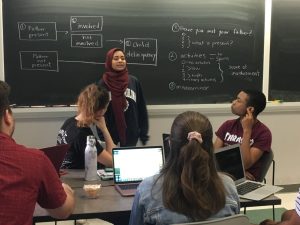 In this project-based course, students will work with a community partner to identify a clinical research question that will contribute to our understanding and treatment of psychological health and human behavior. Using an iterative method reflective of working in a clinical psychology research lab, students will collaborate with one another and community partners to develop hypotheses for the project, to prepare and analyze the data, to propose interpretations of the data, and to present their results.
In this project-based course, students will work with a community partner to identify a clinical research question that will contribute to our understanding and treatment of psychological health and human behavior. Using an iterative method reflective of working in a clinical psychology research lab, students will collaborate with one another and community partners to develop hypotheses for the project, to prepare and analyze the data, to propose interpretations of the data, and to present their results.Offered:
Fall 2019 (Syllabus)
Faculty: Viji Sathy, Psychology and Neuroscience
 This class teaches methodological principles underlying psychology through hands-on project work. Students will work in small groups to pose a novel question, gather and analyze data, and report findings on a topic relevant to the UNC-Chapel Hill community. Over arching course goals are a greater understanding of the importance of collaboration, discovery, and the iterative nature of science.
This class teaches methodological principles underlying psychology through hands-on project work. Students will work in small groups to pose a novel question, gather and analyze data, and report findings on a topic relevant to the UNC-Chapel Hill community. Over arching course goals are a greater understanding of the importance of collaboration, discovery, and the iterative nature of science.
Offered:
Fall 2019 (Syllabus)
Fall 2018 (Syllabus)
Fall 2017 (Syllabus)
- Student-created website: http://inclusivityinthemaking.web.unc.edu/behind-the-research/research-team/











